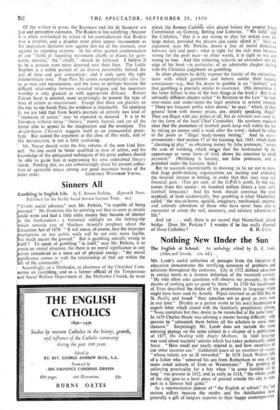Sinners All
" EVERY social advance," says Mr. Perkins, " is capable of being snisused." He illustrates this by pointing out that as soon as people could write and had a little extra money they became of interest Lin the bookmakers ; a historical sidelight on the betting-slip ['which reminds you of Matthew Arnold's prophecy about the .Education Act of 1870: " It will mean, of course, that the improper jpscriptions on our public walls will be not only more legible, 'but much nearer the ground." But -is gambling morally wrong in tself ? To speak of gambling " in itself," says Mr. Perkins, is to create an unreal situation, for there is no moral significance in any taction considered as a mere act of physical energy: " the moral lsignificance comes in with the relationship of that act within the ife of the community." Accordingly, as a Methodist, as chairman of the Churches' Com- mittee on Gambling, and as a former official of the Temperance and Social Welfare Department of the Methodist Church, he must attack the Roman eathAse view placed before the present Royal Commission on Gaming, Betting and Lotteries. " We hold," said the Catholics, " that it is not wrong to play for stakes, even for large stakes, provided the players can easily afford it." Such an argument, says Mr. Perkins, draws a line of moral distinction between rich and poor ; what is right for the rich man becomes wrong for the poor man—in other words, it is tight to win and wrong to lose. And this withering reductio ad absurdum sets the edge of his book—in particular, of an admirable chapter dealing with the Christian judgernent on gambling.
In other chapters he deftly exposes the fatuity of the rationalisa- tions with which gamblers and betters soothe their tattered consciences—e.g., that the desire to gamble is an " instinct," and that gambling is precisely similar to insurance. (His demolition of the latter fallacy is one of the best things in the book.) But in an advisedly diffident chapter called " In Relation to the Law " he both over-states and under-states the legal position in several respects. "There are frequent public whist drives," he says, " which, in their general form with money prizes, are, strictly speaking, illegal." They are illegal with any prizes at all, but de minimis non curat lex (in the form of the local Chief Constable). He nowhere makes it clear that the promoters of football pools keep well within the law by taking no money until a week after the event ; indeed he refers to the pools as " illegal ready-money betting." And he says- erroneously—that section 17 of the Gaming Act, 1845, which treats " cheating at play " as obtaining money by false pretences, " covers the case of welshing, which mewls that the bookmaker by dis- appearance or some form of trick shows his intention to avoid payment." (Welshing is larceny, not false pretences, and is punished under the Larceny Acts.) But he succeeds incontestably in showing, as he set out to show, that huge profit-making organisations are inciting and extending the feverish interest in betting, in order that they may reap vast financial gain. (Ten per cent. of the G.P.O.'s profit, by the way, comes from this source ; six hundred million letters a year carry football forecasts.) And his book should convince the most sceptical, at least academically, that gambling is what Maeterlinck called " the stay-at-home, squalid, imaginary, mechanical, anaemic, and unlovely adventure of those who have never been able to encounter or create the real, necessary, and salutary adventure of life."
And yet . . . well, there is no record that Maeterlinck played bridge. Does Mr. Perkins ? I wonder if he has really disposed


























 Previous page
Previous page